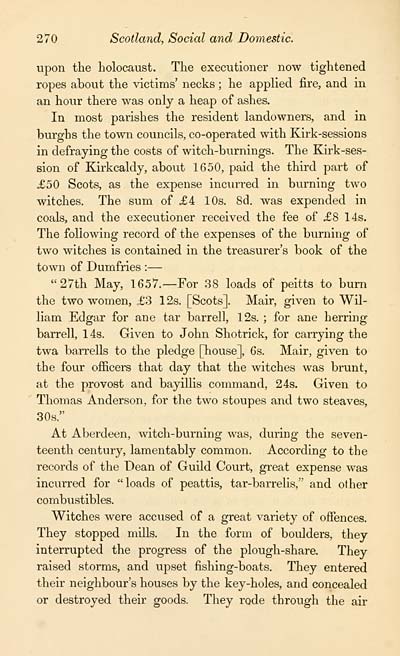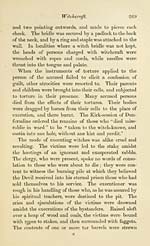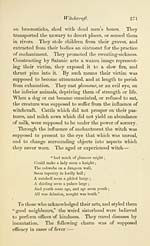Grampian Club > Scotland, social and domestic
(276) Page 270
Download files
Complete book:
Individual page:
Thumbnail gallery: Grid view | List view

270 Scotland, Social and Domestic.
upon the holocaust. The executioner now tightened
ropes about the victims' necks ; he applied fire, and in
an hour there was only a heap of ashes.
In most parishes the resident landowners, and in
burghs the town councils, co-operated with Kirk-sessions
in defraying the costs of witch-burnings. The Kirk -ses-
sion of Kirkcaldy, about 1650, paid the third part of
£50 Scots, as the expense incurred in burning two
witches. The sum of £4 10s. 8d. was expended in
coals, and the executioner received the fee of £8 14s.
The following record of the expenses of the burning of
two witches is contained in the treasurer's book of the
town of Dumfries : —
"27th May, 1657.— For 38 loads of peitts to burn
the two women, £3 12s. [Scots]. Mair, given to Wil-
liam Edgar for ane tar barrell, 12s. ; for ane herring
barrell, 1 4s. Given to John Shotrick, for carrying the
twa barrells to the pledge [house], 6s. Mair, given to
the four officers that day that the witches was brunt,
at the provost and bayillis command, 24s. Given to
Thomas Anderson, for the two stoupes and two steaves,
30s."
At Aberdeen, witch-burning was, during the seven-
teenth century, lamentably common. According to the
records of the Dean of Guild Court, great expense was
incurred for "loads of peattis, tar-barrelis," and other
combustibles.
Witches were accused of a great variety of offences.
They stopped mills. In the form of boulders, they
interrupted the progress of the plough-share. They
raised storms, and upset fishing-boats. They entered
their neighbour's houses by the key -holes, and concealed
or destroyed their goods. They rode through the air
upon the holocaust. The executioner now tightened
ropes about the victims' necks ; he applied fire, and in
an hour there was only a heap of ashes.
In most parishes the resident landowners, and in
burghs the town councils, co-operated with Kirk-sessions
in defraying the costs of witch-burnings. The Kirk -ses-
sion of Kirkcaldy, about 1650, paid the third part of
£50 Scots, as the expense incurred in burning two
witches. The sum of £4 10s. 8d. was expended in
coals, and the executioner received the fee of £8 14s.
The following record of the expenses of the burning of
two witches is contained in the treasurer's book of the
town of Dumfries : —
"27th May, 1657.— For 38 loads of peitts to burn
the two women, £3 12s. [Scots]. Mair, given to Wil-
liam Edgar for ane tar barrell, 12s. ; for ane herring
barrell, 1 4s. Given to John Shotrick, for carrying the
twa barrells to the pledge [house], 6s. Mair, given to
the four officers that day that the witches was brunt,
at the provost and bayillis command, 24s. Given to
Thomas Anderson, for the two stoupes and two steaves,
30s."
At Aberdeen, witch-burning was, during the seven-
teenth century, lamentably common. According to the
records of the Dean of Guild Court, great expense was
incurred for "loads of peattis, tar-barrelis," and other
combustibles.
Witches were accused of a great variety of offences.
They stopped mills. In the form of boulders, they
interrupted the progress of the plough-share. They
raised storms, and upset fishing-boats. They entered
their neighbour's houses by the key -holes, and concealed
or destroyed their goods. They rode through the air
Set display mode to: Large image | Transcription
Images and transcriptions on this page, including medium image downloads, may be used under the Creative Commons Attribution 4.0 International Licence unless otherwise stated. ![]()
| Publications by Scottish clubs > Grampian Club > Scotland, social and domestic > (276) Page 270 |
|---|
| Permanent URL | https://digital.nls.uk/81899996 |
|---|
| Description | Note: Numbers 24-41 are relative to but not part of the Club's series. |
|---|---|

